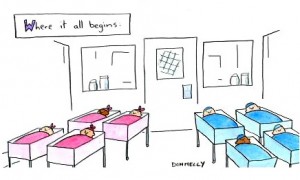
In the New York Times op-ed, “Google, Tell Me, Is My Son a Genius?” (Jan 18, 2014), Seth Stephens-Davidowitz points to new research suggesting that parental concerns about boys differ from parental concerns about girls in some surprising and troubling ways. Searches show that parents–across the board–are more worried about the appearance of their daughters, and the intelligence of their sons.
Stephens-Davidowitz writes, “Liberal readers may imagine that these biases are more common in conservative parts of the country. Not so. I did not find a significant relationship between any of the biases mentioned and the political or cultural makeup of a state. These biases appear to cut across ideological divisions. In fact, I was unable to find any demographics that significantly reduced the biases. Nor is there evidence that these biases have decreased since 2004, the year for which Google search data is first available.”
Reading this made me want to cry. It also made me want to ask all the smart and savvy girls’ advocates I know: Tell Me Ladies, What Did You Think of This Piece?
Turns out, the conversation was already happening, of course, over at Rebecca Hains’ Facebook page (where many great conversations begin!). We all agreed this is a conversation we need bigtime and would love to continue it, both here and at Rebecca’s page. Our responses are below. Please join us in sharing what you think.
Q: What do you make of these findings?
Rebecca Hains, author of The Princess Problem (forthcoming) and Growing Up with Girl Power and “[S]tudies show that when parents worry about their daughters’ appearances, it negatively impacts the girls’ body images–even if the parents never speak a word about the matter. Kids pick up on our attitudes much more than we realize. So how much do the search patterns revealed in this article explain widespread patterns in kids’ own self-images–boys and girls alike?”
Melissa Atkins Wardy, author of Redefining Girly: “[T]he difference shown in this article feels like a canyon in my heart right now. And how are we supposed to teach parents to do better when it comes to the media when they are such a huge part of the problem themselves?”
Marci Warhaft-Nadler, author of The Body Image Survival Guide: “This is really disappointing. It’s like these outdated gender roles and expectations are so deeply engrained in our psyches that we don’t even recognize it anymore.”
Lori Day, Lori Day Consulting, and author of Her Next Chapter: “This was counter-intuitive to me as an educational psychologist because girls develop more quickly than boys in terms of literacy, language development, social skills, self-help skills, etc. When it comes to two-year-olds, girls are often more mature, and appear more “gifted” (Lake Wobegon issues aside), than their male peers. I have had way more parents of young girls tell me they think their child is gifted than parents of young boys. Maybe the Google searches are picking up data related to kids in elementary school and beyond, when many of the developmental academic advantages for girls relative to boys have washed out. Certainly, it is picking up on parental concern about daughters’ appearance, not something my consulting clients usually talk to me about, but something that does not surprise me as an author who writes about today’s girl culture.”
Deborah Siegel, author of The Gender Years (a graphic memoir-in-progress) and Sisterhood, Interrupted: “That piece made me want to cry. Interesting note, though, the author ends with: ‘we might examine whether these gender preferences change after a woman is elected to run a country.’ Wondering, like the rest of you, what else might change the painful imbalance in parental expectation, from within. This shit goes so deep.”
Rebecca Hains: “We know that media portrayals of boys and girls mirror and then reinforce cultural attitudes. It’s cyclical. Other studies show that to kids, it’s really important that boy characters in the media be smart and that girl characters be pretty: girls identify with female characters they consider attractive, whereas boys identify with male characters they consider intelligent. This is probably because of these biases they pick up on, both in the home and at school, as well as in other media. I think effecting change requires both consciousness-raising (helping us all to see our own biases, so that we can overcome them) and media literacy work (to help parents and kids break down and resist the biases they see on screen). And of course it also requires activism, to hold media producers accountable when they perpetuate these biases. There’s so much work to be done, it’s overwhelming. But it’s important, and it’s time.”
Girl w/Pen readers, your thoughts?


Comments 2
“Is my son smart?” “Is my daughter skinny?” | Rebecca Hains — January 20, 2014
[…] Note 2: Deborah Siegel of Girl w/ Pen, did a great job pulling together some excerpts from our conversation on my facebook page to share on her blog. Check it out here. […]
Elline Lipkin — January 23, 2014
Such astute comments and it helps to share the pain! After reading the original article I felt flattened -- so much work ahead, so much farther to go, and when the media is such a large part of the problem, as pointed out, it makes one wonder how to enact pressure towards effective, systemic change. But I am yet hopeful -- the cohort above all doing such great work -- and I see change in my own child's generation.